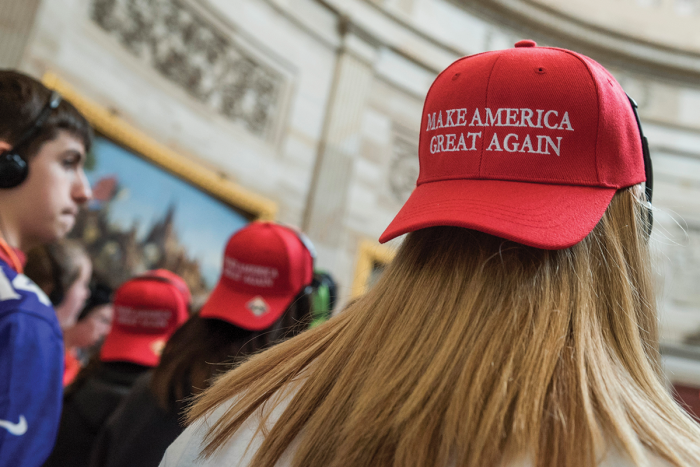In the 2016 Trump Effect reports, we reported that bullying had been politicized, with even young students latching on to political talking points and slogans as a way of isolating and intimidating others. This investigation found a continuation of this trend.
Educators told us that this level of polarization they’re seeing is a new phenomenon and that even elementary students are affected. “In my 20 years of teaching,” a Maine educator wrote, “I have never heard students in grades 1–5 so politically divided.”
While it’s important to recognize that political polarization—and the behavior it enables—contributes to an environment where hate can flourish, we did not include political incidents in our tally of hate and bias in schools. One important exception was when political figures and slogans were used to excuse harassment. Most often, political harassment targeted Muslim students or those perceived to be immigrants. But educators reported many incidents in which students combined political rhetoric with bad behavior.
A middle school teacher in Maryland, for example, heard white male students talking about “Trump ‘making America white again.’” And an elementary teacher in Indiana told us of a child who “slapped a student’s bottom and said that Trump says it is okay.”
Polarization manifests not only across a range of issues but also around the president himself, as students divide themselves into pro- and anti-Trump teams. An educator in Georgia, for example, told us that students “as young as kindergarten” are saying, “Yay Trump” or “Trump sucks.” An elementary school teacher in Nebraska told us, “Students have used the name Trump to taunt others. At times it is telling kids that Trump is going to send them home. Other times students have called other kids ‘Trump’ as a put-down.” An elementary teacher in Arizona told us that “students have come to me crying during recess because someone else was bullying them (‘They said I like Trump, but I don’t’).”
Attacks go both ways, often within the same school or class. Educators recalled a litany of student insults such as “republican asshole,” “rethuglicans,” “liberal bacteria” and “libtard snowflakes”—sometimes even during class discussions.

Polarization Impedes Civic Education
Insults like these, educators report, stymie civil classroom discussions of controversial issues and embolden students to demonize their opponents. Political polarization and hair-trigger responses aren’t just happening in social studies classes where students should be discussing current events and politics; they also erupt in English, math, science and during counseling sessions.
Here’s Some of What Educators Told Us About Polarization and Its Chilling Effect on Civics Instruction in Their Schools:
- “Whenever we discuss politics or current events as a class, the class becomes divided along party lines leading to conflict.” (High school, New York)
- “I teach American history and we discuss current events frequently. The discussions over the last two years are much more difficult to facilitate. Students are quick to disagree with each other and discussions become heated much more quickly than they have in the past. And, I admit that I find it difficult myself to deal with the realities of talking about the current administration when students ask questions like, ‘Do women lie about sexual harassment?’” (Middle school, Ohio)
- “As a social studies teacher, I feel unable to teach current events around government issues due to the political tone in our nation. When it comes up, it is divisive among the students.” (Middle school, Massachusetts)
- “In class discussions, students take sides very quickly and refuse to listen to people’s views; they are more likely to shout down or openly diss an opinion they don’t agree with. They are more likely to say negative things about the person rather than argue about the ideas.” (K–12 school, North Dakota)
- “Any time ‘president’ or ‘Trump’ or any past president is mentioned, an argument between students is inevitable. Living in Texas, we have several students that are immigrants, and some have parents stuck on the other side of the border. For them, decisions made are very personal. … Arguments are so heated, I’ve had to immediately stop any conversation about politics in my science classroom for fear of fights.” (High school, Texas)